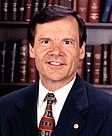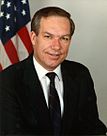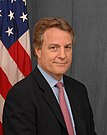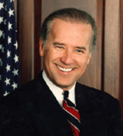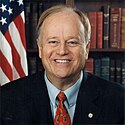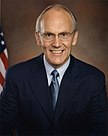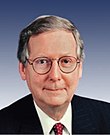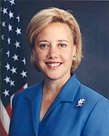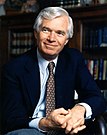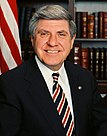1996 United States Senate elections
 From Wikipedia the free encyclopedia
From Wikipedia the free encyclopedia
| ||||||||||||||||||||||||||||||||||||||||
34 of the 100 seats in the United States Senate 51 seats needed for a majority | ||||||||||||||||||||||||||||||||||||||||
|---|---|---|---|---|---|---|---|---|---|---|---|---|---|---|---|---|---|---|---|---|---|---|---|---|---|---|---|---|---|---|---|---|---|---|---|---|---|---|---|---|
| ||||||||||||||||||||||||||||||||||||||||
 Results of the elections (excluding Oregon's Senate special election): Democratic gain Democratic hold Republican gain Republican hold No election Rectangular inset (Kansas): both seats up for election | ||||||||||||||||||||||||||||||||||||||||
| ||||||||||||||||||||||||||||||||||||||||
The 1996 United States Senate elections were held on November 5, 1996, with the 33 seats of Class 2 contested in regular elections. Special elections were also held to fill vacancies. They coincided with the presidential election of the same year, in which Democrat Bill Clinton was re-elected president.
Republicans held a 54–46 majority going into 1996, however, a January special election in Oregon resulted in Democrats reducing the majority to 53–47. Despite the re-election of Clinton and Gore, and despite Democrats picking a net 2 seats up in the elections to the United States House of Representatives held the same day, the Republicans had a net gain of 2 seats in the Senate, following major Republican gains 2 years before in the 1994 elections. As such, Clinton became the only president to be re-elected without ever having any Senate coattails since the ratification of the 17th Amendment.
The Republicans won open seats previously held by Democrats in Alabama, Arkansas, and Nebraska. The only Democratic pickup occurred in South Dakota, where Democrat Tim Johnson narrowly defeated incumbent Republican Larry Pressler. The cycle featured an unusually high number of retirements, with 13 in total.
Results summary
[edit]| 45 | 55 |
| Democratic | Republican |
Does not include Oregon's January 1996 special election. Includes Kansas's special election for the Class III seat vacated by Bob Dole.
| Parties | Total | ||||||||||||||||||||||||||||||||||||||||||||||||||||||||||||||||||||||||||||||||||||||||||||||||||
|---|---|---|---|---|---|---|---|---|---|---|---|---|---|---|---|---|---|---|---|---|---|---|---|---|---|---|---|---|---|---|---|---|---|---|---|---|---|---|---|---|---|---|---|---|---|---|---|---|---|---|---|---|---|---|---|---|---|---|---|---|---|---|---|---|---|---|---|---|---|---|---|---|---|---|---|---|---|---|---|---|---|---|---|---|---|---|---|---|---|---|---|---|---|---|---|---|---|---|---|
| Democratic | Republican | Libertarian | Other | ||||||||||||||||||||||||||||||||||||||||||||||||||||||||||||||||||||||||||||||||||||||||||||||||
| Last elections (1994) | 48 | 52 | 0 | 0 | 100 | ||||||||||||||||||||||||||||||||||||||||||||||||||||||||||||||||||||||||||||||||||||||||||||||
| Before these elections | 47 | 53 | 0 | 0 | 100 | ||||||||||||||||||||||||||||||||||||||||||||||||||||||||||||||||||||||||||||||||||||||||||||||
| Not up | 32 | 34 | — | — | 66 | ||||||||||||||||||||||||||||||||||||||||||||||||||||||||||||||||||||||||||||||||||||||||||||||
| Up | 15 | 19 | — | — | 34 | ||||||||||||||||||||||||||||||||||||||||||||||||||||||||||||||||||||||||||||||||||||||||||||||
| Class 2 (1990→1996) | 15 | 18 | — | — | 33 | ||||||||||||||||||||||||||||||||||||||||||||||||||||||||||||||||||||||||||||||||||||||||||||||
| Special: Class 3 | — | 1 | — | — | 1 | ||||||||||||||||||||||||||||||||||||||||||||||||||||||||||||||||||||||||||||||||||||||||||||||
| Incumbent retired | 8 | 5 | — | — | 13 | ||||||||||||||||||||||||||||||||||||||||||||||||||||||||||||||||||||||||||||||||||||||||||||||
| Held by same party | 5 | 5 | — | — | 10 | ||||||||||||||||||||||||||||||||||||||||||||||||||||||||||||||||||||||||||||||||||||||||||||||
| Replaced by other party | — | — | 3 | ||||||||||||||||||||||||||||||||||||||||||||||||||||||||||||||||||||||||||||||||||||||||||||||||
| Result | 5 | 8 | — | — | 13 | ||||||||||||||||||||||||||||||||||||||||||||||||||||||||||||||||||||||||||||||||||||||||||||||
| Incumbent ran | 7 | 14[a] | — | — | 21 | ||||||||||||||||||||||||||||||||||||||||||||||||||||||||||||||||||||||||||||||||||||||||||||||
| Won re-election | 7 | 12 | — | — | 19 | ||||||||||||||||||||||||||||||||||||||||||||||||||||||||||||||||||||||||||||||||||||||||||||||
| Lost re-election | — | — | 1 | ||||||||||||||||||||||||||||||||||||||||||||||||||||||||||||||||||||||||||||||||||||||||||||||||
| Lost renomination, but held by same party | 0 | 1 | — | — | 1 | ||||||||||||||||||||||||||||||||||||||||||||||||||||||||||||||||||||||||||||||||||||||||||||||
| Result | 8 | 13 | — | — | 21 | ||||||||||||||||||||||||||||||||||||||||||||||||||||||||||||||||||||||||||||||||||||||||||||||
| Total elected | 13 | 21 | 0 | 0 | 34 | ||||||||||||||||||||||||||||||||||||||||||||||||||||||||||||||||||||||||||||||||||||||||||||||
| Net gain/loss | 2 | ||||||||||||||||||||||||||||||||||||||||||||||||||||||||||||||||||||||||||||||||||||||||||||||||||
| Nationwide vote | 23,951,995 | 24,785,416 | 362,208 | 969,246 | 50,068,865 | ||||||||||||||||||||||||||||||||||||||||||||||||||||||||||||||||||||||||||||||||||||||||||||||
| Share | 47.84% | 49.50% | 0.72% | 1.94% | 100% | ||||||||||||||||||||||||||||||||||||||||||||||||||||||||||||||||||||||||||||||||||||||||||||||
| Result | 45 | 55 | — | — | 100 | ||||||||||||||||||||||||||||||||||||||||||||||||||||||||||||||||||||||||||||||||||||||||||||||
Sources:
- Party Division in the Senate, 1789–Present, via Senate.gov
- Clerk of the U.S. House of Representatives:[1]
Gains, losses, and holds
[edit]Retirements
[edit]Five Republicans and eight Democrats retired instead of seeking re-election.
Defeats
[edit]One Republican sought re-election but lost in the general election. One Republican also sought election to finish the unexpired term but lost in the primary.
| State | Senator | Replaced by |
|---|---|---|
| Kansas (special) | Sheila Frahm | Sam Brownback |
| South Dakota | Larry Pressler | Tim Johnson |
Vacancies
[edit]One Republican seat was vacant and was filled by a Democrat.
| State | Senator | Replaced by |
|---|---|---|
| Oregon (special) | Bob Packwood | Ron Wyden |
Change in composition
[edit]Before the November elections
[edit]After the January 1996 special election in Oregon.
| D1 Ore. (Sp) Gain | D2 | D3 | D4 | D5 | D6 | D7 | D8 | D9 | D10 |
| D20 | D19 | D18 | D17 | D16 | D15 | D14 | D13 | D12 | D11 |
| D21 | D22 | D23 | D24 | D25 | D26 | D27 | D28 | D29 | D30 |
| D40 Mass. Ran | D39 La. Retired | D38 Iowa Ran | D37 Ill. Retired | D36 Ga. Retired | D35 Del. Ran | D34 Ark. Retired | D33 Ala. Retired | D32 | D31 |
| D41 Mich. Ran | D42 Minn. Ran | D43 Mont. Ran | D44 Neb. Retired | D45 N.J. Retired | D46 R.I. Retired | D47 W.Va. Ran | R53 Wyo. Retired | R52 Va. Ran | R51 Texas Ran |
| Majority → | |||||||||
| R41 Me. Retired | R42 Miss. Ran | R43 N.H. Ran | R44 N.M. Ran | R45 N.C. Ran | R46 Okla. Ran | R47 Ore. (reg) Retired | R48 S.C. Ran | R49 S.D. Ran | R50 Tenn. Ran |
| R40 Ky. Ran | R39 Kan. (Sp) Ran | R38 Kan. (reg) Retired | R37 Idaho Ran | R36 Colo. Retired | R35 Alaska Ran | R34 | R33 | R32 | R31 |
| R21 | R22 | R23 | R24 | R25 | R26 | R27 | R28 | R29 | R30 |
| R20 | R19 | R18 | R17 | R16 | R15 | R14 | R13 | R12 | R11 |
| R1 | R2 | R3 | R4 | R5 | R6 | R7 | R8 | R9 | R10 |
After the November elections
[edit]| D1 | D2 | D3 | D4 | D5 | D6 | D7 | D8 | D9 | D10 |
| D20 | D19 | D18 | D17 | D16 | D15 | D14 | D13 | D12 | D11 |
| D21 | D22 | D23 | D24 | D25 | D26 | D27 | D28 | D29 | D30 |
| D40 Minn. Re-elected | D39 Mich. Re-elected | D38 Mass. Re-elected | D37 La. Hold | D36 Iowa Re-elected | D35 Ill. Hold | D34 Ga. Hold | D33 Del. Re-elected | D32 | D31 |
| D41 Mont. Re-elected | D42 N.J. Hold | D43 R.I. Hold | D44 W.Va. Re-elected | D45 S.D. Gain | R55 Neb. Gain | R54 Ark. Gain | R53 Ala. Gain | R52 Wyo. Hold | R51 Va. Re-elected |
| Majority → | |||||||||
| R41 Me. Hold | R42 Miss. Re-elected | R43 N.H. Re-elected | R44 N.M. Re-elected | R45 N.C. Re-elected | R46 Okla. Re-elected | R47 Ore. (reg) Hold | R48 S.C. Re-elected | R49 Tenn. Re-elected | R50 Texas Re-elected |
| R40 Ky. Re-elected | R39 Kan. (Sp) Hold | R38 Kan. (reg) Hold | R37 Idaho Re-elected | R36 Colo. Hold | R35 Alaska Re-elected | R34 | R33 | R32 | R31 |
| R21 | R22 | R23 | R24 | R25 | R26 | R27 | R28 | R29 | R30 |
| R20 | R19 | R18 | R17 | R16 | R15 | R14 | R13 | R12 | R11 |
| R1 | R2 | R3 | R4 | R5 | R6 | R7 | R8 | R9 | R10 |
| Key |
|
|---|
Summary of contests
[edit]Special elections during the 104th Congress
[edit]In these special elections, the winner was seated in the fall of 1996 (excluding Oregon), once they qualified and their elections were certified. Sorted by election date, then state, then class.
| State | Incumbent | Results | Candidates | ||
|---|---|---|---|---|---|
| Senator | Party | Electoral history | |||
| Oregon (Class 3) | Bob Packwood | Republican | 1968 1974 1980 1986 1992 | Incumbent resigned. New senator elected January 30, 1996 and seated February 6, 1996. Democratic gain. |
Others
|
| Kansas (Class 3) | Sheila Frahm | Republican | 1996 (appointed) | Interim appointee lost nomination. New senator elected November 5, 1996 and seated November 7, 1996. Republican hold. |
|
Elections leading to the next Congress
[edit]In these general elections, the winners were elected for the term beginning January 3, 1997; ordered by state.
All of the elections involved the Class 2 seats.
| State | Incumbent | Results | Candidates | ||
|---|---|---|---|---|---|
| Senator | Party | Electoral history | |||
| Alabama | Howell Heflin | Democratic | 1978 1984 1990 | Incumbent retired. Republican gain. |
Others
|
| Alaska | Ted Stevens | Republican | 1968 (appointed) 1970 1972 1978 1984 1990 | Incumbent re-elected. |
|
| Arkansas | David Pryor | Democratic | 1978 1984 1990 | Incumbent retired. Republican gain. |
|
| Colorado | Hank Brown | Republican | 1990 | Incumbent retired. Republican hold. |
|
| Delaware | Joe Biden | Democratic | 1972 1978 1984 1990 | Incumbent re-elected. |
Others
|
| Georgia | Sam Nunn | Democratic | 1972 (special) 1972 1978 1984 1990 | Incumbent retired. Democratic hold. |
|
| Idaho | Larry Craig | Republican | 1990 | Incumbent re-elected. |
Others
|
| Illinois | Paul Simon | Democratic | 1984 1990 | Incumbent retired. Democratic hold. |
Others
|
| Iowa | Tom Harkin | Democratic | 1984 1990 | Incumbent re-elected. |
Others
|
| Kansas | Nancy Kassebaum | Republican | 1978 1978 (appointed) 1984 1990 | Incumbent retired. Republican hold. |
Others
|
| Kentucky | Mitch McConnell | Republican | 1984 1990 | Incumbent re-elected. |
Others
|
| Louisiana | Bennett Johnston | Democratic | 1972 1972 (appointed) 1978 1984 1990 | Incumbent retired. Democratic hold. |
|
| Maine | William Cohen | Republican | 1978 1984 1990 | Incumbent retired. Republican hold. |
|
| Massachusetts | John Kerry | Democratic | 1984 1990 | Incumbent re-elected. |
|
| Michigan | Carl Levin | Democratic | 1978 1984 1990 | Incumbent re-elected. |
Others
|
| Minnesota | Paul Wellstone | DFL | 1990 | Incumbent re-elected. |
Others
|
| Mississippi | Thad Cochran | Republican | 1978 1978 (appointed) 1984 1990 | Incumbent re-elected. |
|
| Montana | Max Baucus | Democratic | 1978 1984 1990 | Incumbent re-elected. |
|
| Nebraska | Jim Exon | Democratic | 1978 1984 1990 | Incumbent retired. Republican gain. |
|
| New Hampshire | Bob Smith | Republican | 1990 1990 (appointed) | Incumbent re-elected. |
|
| New Jersey | Bill Bradley | Democratic | 1978 1984 1990 | Incumbent retired. Democratic hold. |
Others
|
| New Mexico | Pete Domenici | Republican | 1972 1978 1984 1990 | Incumbent re-elected. |
|
| North Carolina | Jesse Helms | Republican | 1972 1978 1984 1990 | Incumbent re-elected. |
Others
|
| Oklahoma | Jim Inhofe | Republican | 1994 (special) | Incumbent re-elected. |
Others
|
| Oregon | Mark Hatfield | Republican | 1966 1972 1978 1984 1990 | Incumbent retired. Republican hold. |
Others
|
| Rhode Island | Claiborne Pell | Democratic | 1960 1966 1972 1978 1984 1990 | Incumbent retired. Democratic hold. |
|
| South Carolina | Strom Thurmond | Republican | 1954 (write-in)[b] 1954 (appointed) 1956 (resigned) 1956 (special) 1960 1966 1972 1978 1984 1990 | Incumbent re-elected. |
Others
|
| South Dakota | Larry Pressler | Republican | 1978 1984 1990 | Incumbent lost re-election. Democratic gain. |
|
| Tennessee | Fred Thompson | Republican | 1994 (special) | Incumbent re-elected. |
Others
|
| Texas | Phil Gramm | Republican | 1984 1990 | Incumbent re-elected. |
Others
|
| Virginia | John Warner | Republican | 1978 1979 (appointed) 1984 1990 1996 | Incumbent re-elected. |
|
| West Virginia | Jay Rockefeller | Democratic | 1984 1990 | Incumbent re-elected. |
|
| Wyoming | Alan Simpson | Republican | 1978 1979 (appointed) 1984 1990 | Incumbent retired. Republican hold. |
|
Closest races
[edit]Sixteen races, as well as the Oregon special election in January, had margins less than 10%:
| State | Party of winner | Margin |
|---|---|---|
| Louisiana | Democratic | 0.34% |
| Georgia | Democratic | 1.3% |
| Oregon (special) | Democratic (flip) | 1.5% |
| South Dakota | Democratic (flip) | 2.6% |
| New Hampshire | Republican | 3.0% |
| Oregon (regular) | Republican | 3.9% |
| Montana | Democratic | 4.9% |
| Virginia | Republican | 5.1% |
| Iowa | Democratic | 5.1% |
| Maine | Republican | 5.3% |
| Arkansas | Republican (flip) | 5.4%[c] |
| Colorado | Republican | 5.7% |
| North Carolina | Republican | 6.7% |
| Alabama | Republican (flip) | 7.0% |
| Massachusetts | Democratic | 7.5% |
| Minnesota | Democratic | 9.0% |
| South Carolina | Republican | 9.4% |
Alabama
[edit]
| |||||||||||||||||
 County results Sessions: 40–50% 50–60% 60–70% 70–80% Bedford: 40–50% 50–60% 60–70% 70–80% 80–90% | |||||||||||||||||
| |||||||||||||||||
Incumbent Democrat Howell Heflin decided to retire. Republican and future Attorney General of the United States Jeff Sessions won the open seat, becoming only the second Republican U.S. Senator elected to represent Alabama since Reconstruction. This seat would remain controlled by Republicans until the election of Doug Jones[2] in 2017.
In the 1968 presidential election, Alabama supported American Independent Party candidate George Wallace over both Richard Nixon and Hubert Humphrey. Wallace was the official Democratic candidate in Alabama, while Humphrey was listed as the "National Democratic".[3] In 1976, Democratic candidate Jimmy Carter from Georgia carried the state, the region, and the nation, but Democratic control of the region slipped after that.
Since 1980, conservative Alabama voters have increasingly voted for Republican candidates at the Federal level, especially in Presidential elections. By contrast, Democratic candidates have been elected to many state-level offices and, until 2010, comprised a longstanding majority in the Alabama Legislature.
Roger Bedford won the Democratic primary over Glen Browder. Sessions won the Republican primary over Sid McDonald and Charles Woods, defeating McDonald in the runoff. Sessions then defeated Bedford by a seven-point margin.
| Party | Candidate | Votes | % | |
|---|---|---|---|---|
| Democratic | Roger Bedford | 141,360 | 44.77% | |
| Democratic | Glen Browder | 91,203 | 28.89% | |
| Democratic | Natalie Davis | 71,588 | 22.67% | |
| Democratic | Marilyn Q. Bromberg | 11,573 | 3.67% | |
| Total votes | 315,724 | 100.00% | ||
| Party | Candidate | Votes | % | |
|---|---|---|---|---|
| Democratic | Roger Bedford | 141,747 | 61.59% | |
| Democratic | Glen Browder | 88,415 | 38.41% | |
| Total votes | 230,162 | 100.00% | ||
| Party | Candidate | Votes | % | |
|---|---|---|---|---|
| Republican | Jeff Sessions | 82,373 | 37.81% | |
| Republican | Sid McDonald | 47,320 | 21.72% | |
| Republican | Charles Woods | 24,409 | 11.20% | |
| Republican | Frank McRight | 21,964 | 10.08% | |
| Republican | Walter D. Clark | 18,745 | 8.60% | |
| Republican | Jimmy Blake | 15,385 | 7.06% | |
| Republican | Albert Lipscomb | 7,672 | 3.52% | |
| Total votes | 217,868 | 100.00% | ||
| Party | Candidate | Votes | % | |
|---|---|---|---|---|
| Republican | Jeff Sessions | 81,681 | 59.26% | |
| Republican | Sid McDonald | 56,156 | 40.74% | |
| Total votes | 137,837 | 100.00% | ||
| Party | Candidate | Votes | % | |
|---|---|---|---|---|
| Republican | Jeff Sessions | 786,436 | 52.45% | |
| Democratic | Roger Bedford | 681,651 | 45.46% | |
| Libertarian | Mark Thornton | 21,550 | 1.44% | |
| Natural Law | Charles Hebner | 9,123 | 0.61% | |
| Independent | Write-ins | 633 | 0.04% | |
| Total votes | 1,499,393 | 100.00% | ||
| Republican gain from Democratic | ||||
Alaska
[edit]
| |||||||||||||||||||||||||||||||||||||
 Results by state house district Stevens: 50–60% 60–70% 70–80% 80–90% | |||||||||||||||||||||||||||||||||||||
| |||||||||||||||||||||||||||||||||||||
Incumbent Republican Ted Stevens ran for re-election to a sixth term. He defeated Republican Dave W. Cuddy in the open primary.
In the general election, Stevens faced off against Democratic nominee Theresa Obermeyer, a former member of the Anchorage School Board,[4] and Green Party nominee Jed Whittaker, a commercial fisherman.
The race drew national attention for Obermeyer's erratic behavior: she blamed Stevens for her husband's failure to pass the bar exam and contended that he had passed the bar by fraud. She "trailed" him to campaign events, frequently wearing a prisoner's outfit and once dragging a ball and chain behind her. During the campaign, she was arrested and served 30 days in prison in California and Oregon for probation violations.[5]
Stevens was re-elected in an overwhelming landslide and Whittaker finished ahead of Obermeyer.
| Party | Candidate | Votes | % | |
|---|---|---|---|---|
| Republican | Ted Stevens (Incumbent) | 71,043 | 58.87% | |
| Republican | Dave W. Cuddy | 32,994 | 27.34% | |
| Democratic | Theresa Obermeyer | 4,072 | 3.37% | |
| Green | Jed Whittaker | 3,751 | 3.11% | |
| Democratic | Joseph A. Sonneman | 2,643 | 2.19% | |
| Democratic | Michael Beasley | 1,968 | 1.63% | |
| Democratic | Henry J. Blake Jr. | 1,157 | 0.96% | |
| Democratic | Lawrence Freiberger | 921 | 0.76% | |
| Republican | Charles E. McKee | 842 | 0.70% | |
| Democratic | Frank Vondersaar | 655 | 0.54% | |
| Democratic | Robert Alan Gigler | 631 | 0.52% | |
| Total votes | 138,492 | 100.00% | ||
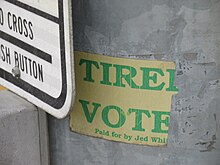
| Party | Candidate | Votes | % | ±% | |
|---|---|---|---|---|---|
| Republican | Ted Stevens (Incumbent) | 177,893 | 76.71% | +10.48% | |
| Green | Jed Whittaker | 29,037 | 12.52% | ||
| Democratic | Theresa Obermeyer | 23,977 | 10.34% | −21.85% | |
| Write-ins | 1,009 | 0.44% | |||
| Majority | 148,856 | 64.19% | +30.15% | ||
| Turnout | 231,916 | ||||
| Republican hold | Swing | ||||
Arkansas
[edit]
| |||||||||||||||||
 County Results Hutchinson: 50–60% 60–70% 70–80% Bryant: 50–60% 60–70% 70–80% | |||||||||||||||||
| |||||||||||||||||
Incumbent Democrat David Pryor decided to retire. Republican Tim Hutchinson ran unopposed in the Republican primary. Arkansas Attorney General Winston Bryant defeated State Senator Lu Hardin narrowly in the Democratic primary runoff. Hutchinson narrowly prevailed in the general election despite Bill Clinton's victory in the state, winning the open seat.
| Party | Candidate | Votes | % | |
|---|---|---|---|---|
| Republican | Tim Hutchinson | 445,942 | 52.7% | |
| Democratic | Winston Bryant | 400,241 | 47.3% | |
| Majority | 45,701 | 5.4% | ||
| Turnout | 846,183 | 100.0% | ||
| Republican gain from Democratic | ||||
Colorado
[edit]
| |||||||||||||||||
 County results Allard: 40–50% 50–60% 60–70% 70–80% Strickland: 50–60% 60–70% | |||||||||||||||||
| |||||||||||||||||
Incumbent Republican Hank Brown decided to retire instead of seeking a second term. Republican Congressman Wayne Allard won the open seat after defeating Gale Norton in the primary, beating Democrat Tom Strickland, attorney and former U.S. Attorney for the District of Colorado, who himself had defeated Gene Nichol in the Democratic primary.
| Party | Candidate | Votes | % | |
|---|---|---|---|---|
| Democratic | Tom Strickland | 87,294 | 66.13% | |
| Democratic | Gene Nichol | 44,709 | 33.87% | |
| Total votes | 132,003 | 100.00% | ||
| Party | Candidate | Votes | % | |
|---|---|---|---|---|
| Republican | Wayne Allard | 115,064 | 56.83% | |
| Republican | Gale Norton | 87,394 | 43.17% | |
| Total votes | 202,458 | 100.00% | ||
| Party | Candidate | Votes | % | ±% | |
|---|---|---|---|---|---|
| Republican | Wayne Allard | 750,315 | 51.41% | −4.27% | |
| Democratic | Tom Strickland | 667,600 | 45.74% | +4.08% | |
| Natural Law | Randy MacKenzie | 41,620 | 2.85% | ||
| Write-ins | 66 | <0.01% | |||
| Majority | 82,715 | 5.67% | −8.35% | ||
| Turnout | 1,459,601 | ||||
| Republican hold | Swing | ||||
Delaware
[edit]
| |||||||||||||||||
 County results Biden: 50–60% 60–70% | |||||||||||||||||
| |||||||||||||||||
Incumbent Democrat Joe Biden won re-election to a fifth term, beating Republican businessman Raymond Clatworthy, who claimed the Republican nomination in a landslide.[12]
| Party | Candidate | Votes | % | |
|---|---|---|---|---|
| Republican | Raymond J. Clatworthy | 18,638 | 82.24% | |
| Republican | Vance Phillips | 3,307 | 14.59% | |
| Republican | Wilfred Plomis | 717 | 3.17% | |
| Total votes | 22,662 | 100.00% | ||
| Party | Candidate | Votes | % | ±% | |
|---|---|---|---|---|---|
| Democratic | Joe Biden (Incumbent) | 165,465 | 60.04% | −2.64% | |
| Republican | Raymond J. Clatworthy | 105,088 | 38.13% | +2.30% | |
| Libertarian | Mark Jones | 3,340 | 1.21% | −0.28% | |
| Natural Law | Jacqueline Kossoff | 1,698 | 0.62% | ||
| Majority | 60,377 | 21.91% | −4.94% | ||
| Turnout | 275,591 | ||||
| Democratic hold | Swing | ||||
Georgia
[edit]
| |||||||||||||||||
 County results Cleland: 40–50% 50–60% 60–70% 70–80% Millner: 40–50% 50–60% 60–70% | |||||||||||||||||
| |||||||||||||||||
Incumbent Democrat Sam Nunn decided to retire instead of seeking a fifth term. Republicans nominated Guy Millner, a multi-millionaire businessman who was also the unsuccessful candidate who ran against Zell Miller in the 1994 gubernatorial election. Millner emerged as the victor from a crowded 6-person primary in July 1996, which included State Senator Clint Day and former gubernatorial candidate Johnny Isakson. However, Max Cleland, the Secretary of State of Georgia ran unopposed in the Democratic primary.
Despite being held by Democrats since 1852, the election for this seat became tightly contested between Cleland and Millner. It was the closest race for that seat since at least 1852. Nonetheless, Max Cleland defeated Guy Millner on November 5. Max Cleland narrowly edged out a victory with 1,103,993 votes (48.87%) to Guy Millner's 1,073,969 votes (47.54%) – a margin of 1.33%.
The Class 2 United States Senate seat had been reliably Democratic, with a member of that party holding it since 1852. Additionally, no Republican had ever held this seat since it was established in 1789. In fact, during the previous election, Sam Nunn was unanimously re-elected and defeated Mike Hicks by an almost 60% margin in 1984. Republican Paul Coverdell narrowly unseated Democrat Wyche Fowler in Georgia's other United States Senate seat in 1992. On October 9, 1995, 4-term incumbent Class 2 Senator Sam Nunn announced his retirement.[14] This left the seat open for the first time since 1972.
After the retirement of Sam Nunn, Democrats began seeking a successor for him. Eventually, Secretary of State of Georgia Max Cleland entered the race. Cleland was the only Democratic candidate to file for election, thus he became the nominee by default on July 9, 1996. During the primary, he received 517,697 votes – 100%.
Republicans also saw opportunity with an open Senate seat in Georgia. Six candidates filled to enter the Primary Election and become the Republican Nominee after July 9, 1996.
After the Republican Primary, Guy Millner emerged as the nominee. Charles Bullock, a political scientist at the University of Georgia, noted that defeated rival Johnny Isakson was more likely to win the moderate vote due to his pro-abortion rights views on abortion. Several polls earlier that year showed Cleland defeating both Millner and Isakson. In contrast to Isakson's opinion, Guy Millner was opposed to abortion except in the case of rape, incest, or to save the life of the mother. Johnny Isakson was later elected United States Senator after Zell Miller retired from his seat in 2004. Opponent Max Cleland quickly labeled Millner as an extremist, saying that "I think people in this state want to elect a moderate ... not an extremist, not an ideologue, and not somebody hung up on some ideological agenda." In response, Millner began campaigning on other issues to capture more moderate voters.[15]
On Election Day, Democratic nominee Max Cleland narrowly won against Republican Guy Millner. It was one of the closest United States Senate Elections in the history of Georgia. Cleland received 1,103,993 votes to Millner's 1,073,969 votes. Libertarian candidate Jack Cashin obtained 81,262 votes, while only 8 people voted for Independent Arlene Rubinstein.
| Party | Candidate | Votes | % | |
|---|---|---|---|---|
| Democratic | Max Cleland | 1,103,993 | 48.87% | |
| Republican | Guy Millner | 1,073,969 | 47.54% | |
| Libertarian | Jack Cashin | 81,262 | 3.60% | |
| Independent | Arlene Rubinstein | 8 | 0.00% | |
| Majority | 30,024 | 1.33% | ||
| Turnout | 2,259,232 | |||
| Democratic hold | ||||
Idaho
[edit]
| |||||||||||||||||
| |||||||||||||||||
 County results Craig: 40–50% 50–60% 60–70% 70–80% Minnick: 50–60% 60–70% | |||||||||||||||||
| |||||||||||||||||
Incumbent Larry Craig won re-election against Democrat Walt Minnick, businessman and former Nixon Administration official, in a landslide.
| Party | Candidate | Votes | % | |
|---|---|---|---|---|
| Democratic | Walt Minnick | 34,551 | 100.00% | |
| Total votes | 34,551 | 100.00% | ||
| Party | Candidate | Votes | % | |
|---|---|---|---|---|
| Republican | Larry Craig (Incumbent) | 106,817 | 100.00% | |
| Total votes | 106,817 | 100.00% | ||
| Party | Candidate | Votes | % | ±% | |
|---|---|---|---|---|---|
| Republican | Larry Craig (Incumbent) | 283,532 | 57.02% | −4.27% | |
| Democratic | Walt Minnick | 198,422 | 39.91% | +1.20% | |
| Independent | Mary J. Charbonneau | 10,137 | 2.04% | ||
| Natural Law | Susan Vegors | 5,142 | 1.03% | ||
| Majority | 85,110 | 17.12% | −5.47% | ||
| Turnout | 497,233 | ||||
| Republican hold | Swing | ||||
Illinois
[edit]
| |||||||||||||||||
 County results Durbin: 40–50% 50–60% 60–70% Salvi: 40–50% 50–60% 60–70% | |||||||||||||||||
| |||||||||||||||||
Incumbent Democrat Paul Simon opted to retire rather than seek a third term. In the Democratic primary, Congressman Dick Durbin emerged victorious over future governor Pat Quinn, while State Representative Al Salvi won the Republican primary in an upset over incumbent Lieutenant Governor Bob Kustra. Though the election was initially anticipated to be close, Durbin defeated Salvi by a comfortable 15-point margin of victory, allowing him to win what would be the first of several terms in the Senate.
| Party | Candidate | Votes | % | |
|---|---|---|---|---|
| Democratic | Dick Durbin | 512,520 | 64.87% | |
| Democratic | Pat Quinn | 233,138 | 29.51% | |
| Democratic | Ronald F. Gibbs | 17,681 | 2.24% | |
| Democratic | Jalil Ahmad | 17,211 | 2.18% | |
| Democratic | Paul H. D. Park | 9,505 | 1.20% | |
| Total votes | 790,055 | 100.00% | ||
| Party | Candidate | Votes | % | |
|---|---|---|---|---|
| Republican | Al Salvi | 377,141 | 47.64% | |
| Republican | Bob Kustra | 342,935 | 43.32% | |
| Republican | Robert Marshall | 43,937 | 5.55% | |
| Republican | Martin Paul Gallagher | 17,276 | 2.18% | |
| Republican | Wayne S. Kurzeja | 10,356 | 1.31% | |
| Total votes | 791,645 | 100.00% | ||
| Party | Candidate | Votes | % | ±% | |
|---|---|---|---|---|---|
| Democratic | Dick Durbin | 2,384,028 | 56.09% | −8.98% | |
| Republican | Al Salvi | 1,728,824 | 40.67% | +5.74% | |
| Reform | Steven H. Perry | 61,023 | 1.44% | ||
| Libertarian | Robin J. Miller | 41,218 | 0.97% | ||
| Constitution | Chad N. Koppie | 17,563 | 0.40% | ||
| Natural Law | James E. Davis | 13,838 | 0.33% | ||
| Write-ins | 4,228 | 0.10% | |||
| Majority | 655,204 | 15.41% | −14.72% | ||
| Turnout | 4,250,722 | ||||
| Democratic hold | Swing | ||||
Iowa
[edit]
| |||||||||||||||||
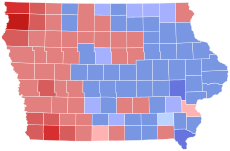 County results Harkin: 30-40% 40–50% 50–60% 60–70% Lightfoot: 40-50% 50-60% 60-70% 70–80% 80-90% | |||||||||||||||||
| |||||||||||||||||
Incumbent Democrat Tom Harkin sought re-election to a third term unopposed in the Democratic primary, and he was challenged by Congressman Jim Ross Lightfoot from Iowa's 3rd congressional district, who won the Republican primary over Maggie Tinsman. Lightfoot had won the Republican primary against two opponents, while Harkin had won his primary uncontested, so both moved on to the general election, where they engaged in a toughly-fought campaign. Ultimately, Harkin was successful in his bid, and defeated Lightfoot, albeit by the thinnest margin of his career — 5.1 points.
| Party | Candidate | Votes | % | |
|---|---|---|---|---|
| Democratic | Tom Harkin (Incumbent) | 98,737 | 99.19% | |
| Democratic | Write-ins | 810 | 0.81% | |
| Total votes | 99,547 | 100.00% | ||
| Party | Candidate | Votes | % | |
|---|---|---|---|---|
| Republican | Jim Ross Lightfoot | 101,608 | 61.48% | |
| Republican | Maggie Tinsman | 40,955 | 24.78% | |
| Republican | Steve Grubbs | 22,554 | 13.65% | |
| Republican | Write-ins | 153 | 0.09% | |
| Total votes | 165,270 | 100.00% | ||
| Party | Candidate | Votes | % | ±% | |
|---|---|---|---|---|---|
| Democratic | Tom Harkin (Incumbent) | 634,166 | 51.81% | −2.66% | |
| Republican | James Ross Lightfoot | 571,807 | 46.71% | +1.30% | |
| Independent | Sue Atkinson | 9,768 | 0.80% | ||
| Natural Law | Fred Gratzon | 4,248 | 0.35% | ||
| Independent | Joe Sulentic | 1,941 | 0.16% | ||
| Socialist Workers | Shirley E. Pena | 1,844 | 0.15% | ||
| Write-ins | 280 | 0.02% | |||
| Majority | 62,359 | 5.09% | −3.96% | ||
| Turnout | 1,224,054 | ||||
| Democratic hold | Swing | ||||
Kansas
[edit]Due to the resignation of Bob Dole campaigning for the Presidential election, there were two elections in Kansas as both seats were up for election.
Kansas (regular)
[edit]
| |||||||||||||||||
 County results Roberts: 40-50% 50-60% 60-70% 70-80% 80-90% Thompson: 60–70% | |||||||||||||||||
| |||||||||||||||||
Incumbent Republican Nancy Kassebaum decided to retire instead of seeking a fourth term. Republican Pat Roberts won the open seat, beating the Democratic Kansas State Treasurer Sally Thompson. Thompson faced no primary opposition, while Roberts faced token opposition.
Term limits were an issue during the campaign; while Roberts said that he was not totally opposed to term limits, he was wary of limits that did not apply to current members of Congress, saying that the proposed limits should apply to everyone. While Thompson signed the national term limits pledge from the group Americans for Limited Terms, Roberts declined to do so, becoming the only major party candidate for the U.S. Senate in the 1996 elections to not sign the pledge.[20] However, he did say that "I plan only to serve two terms in the U.S. Senate."[21] In 2014, he was elected to a fourth term in office.
| Party | Candidate | Votes | % | |
|---|---|---|---|---|
| Democratic | Sally Thompson | 121,476 | 100.00% | |
| Total votes | 121,476 | 100.00% | ||
| Party | Candidate | Votes | % | |
|---|---|---|---|---|
| Republican | Pat Roberts | 245,411 | 78.21% | |
| Republican | Tom Little | 25,052 | 7.98% | |
| Republican | Tom Oyler | 23,266 | 7.42% | |
| Republican | Richard L. Cooley | 20,060 | 6.39% | |
| Total votes | 313,789 | 100.00% | ||
| Party | Candidate | Votes | % | ±% | |
|---|---|---|---|---|---|
| Republican | Pat Roberts | 652,677 | 62.02% | −11.57% | |
| Democratic | Sally Thompson | 362,380 | 34.44% | +8.05% | |
| Reform | Mark S. Marney | 24,145 | 2.29% | ||
| Libertarian | Steven Rosile | 13,098 | 1.25% | ||
| Majority | 290,297 | 27.59% | −19.61% | ||
| Turnout | 1,052,300 | ||||
| Republican hold | Swing | ||||
Kansas (special)
[edit]
| |||||||||||||||||
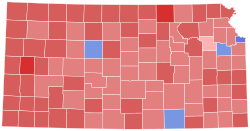 County Results Brownback: 40–50% 50–60% 60–70% 70–80% Docking: 50–60% 60–70% | |||||||||||||||||
| |||||||||||||||||
Incumbent Republican Sheila Frahm, who was recently appointed to the seat, was defeated in the primary by Sam Brownback, who went on to win the general election by ten points over Jill Docking, businesswoman and daughter-in-law of former Kansas Governor Robert Docking, who herself had defeated Joan Finney in the Democratic primary. Brownback would remain in office until 2011, since he retired to run for Governor of Kansas in 2010, a race and a gubernatorial election which he eventually won.
| Party | Candidate | Votes | % | |
|---|---|---|---|---|
| Democratic | Jill Docking | 127,012 | 74.39% | |
| Democratic | Joan Finney | 43,726 | 25.61% | |
| Total votes | 170,738 | 100.00% | ||
| Party | Candidate | Votes | % | |
|---|---|---|---|---|
| Republican | Sam Brownback | 187,914 | 54.82% | |
| Republican | Sheila Frahm (Incumbent) | 142,487 | 41.57% | |
| Republican | Christina Campbell-Cline | 12,378 | 3.61% | |
| Total votes | 342,779 | 100.00% | ||
| Party | Candidate | Votes | % | ±% | |
|---|---|---|---|---|---|
| Republican | Sam Brownback | 574,021 | 53.91% | −8.78% | |
| Democratic | Jill Docking | 461,344 | 43.33% | +12.30% | |
| Reform | Donald R. Klaassen | 29,351 | 2.76% | ||
| Majority | 112,677 | 10.58% | −21.08% | ||
| Turnout | 1,064,716 | ||||
| Republican hold | Swing | ||||
Kentucky
[edit]
| |||||||||||||||||
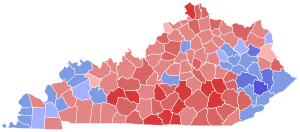 County results McConnell: 40–50% 50–60% 60–70% 70–80% 80–90% Beshear: 40–50% 50–60% 60–70% 70–80% | |||||||||||||||||
| |||||||||||||||||
Incumbent Republican Mitch McConnell won re-nomination over Tommy Klein and then won re-election to a third term with a 12.6% margin of victory over Steve Beshear, a former Lieutenant Governor, who had defeated Tom Barlow in the Democratic primary. McConnell's landslide victory occurred at the same time President Bill Clinton was re-elected to a second term, winning by a 7.5% margin nationwide, but carrying Kentucky by a 0.9% margin.
| Party | Candidate | Votes | % | |
|---|---|---|---|---|
| Democratic | Steve Beshear | 177,859 | 66.38% | |
| Democratic | Tom Barlow | 64,235 | 23.97% | |
| Democratic | Shelby Lanier | 25,856 | 9.65% | |
| Total votes | 267,950 | 100.00% | ||
| Party | Candidate | Votes | % | |
|---|---|---|---|---|
| Republican | Mitch McConnell (Incumbent) | 88,620 | 88.59% | |
| Republican | Tommy Klein | 11,410 | 11.41% | |
| Total votes | 72,373 | 100.00% | ||
In 1996, Beshear started out trailing against McConnell, with an early general election poll placing McConnell ahead of Beshear 50% to 32%.[25] The campaign ultimately became quite harsh, with the McConnell campaign sending "Hunt Man," a take off of Chicken George dressed in "the red velvet coat, jodhpurs, black riding boots and black helmet of a patrician fox hunter." This was done as a means of criticizing Beshear's membership in a fox hunting club in Lexington, and undercut the Beshear campaign's message that McConnell was a Republican in the mold of Newt Gingrich and that Beshear was the only friend of the working class in the race.[26] Beshear did not make much traction with the electorate during the campaign. By October 1996, Beshear had narrowed the gap between himself and McConnell slightly, with McConnell leading Beshear 50% to 38%.[27] Beshear was later elected governor in 2007.
| Party | Candidate | Votes | % | ±% | |
|---|---|---|---|---|---|
| Republican | Mitch McConnell (Incumbent) | 724,794 | 55.45% | +3.27% | |
| Democratic | Steve Beshear | 560,012 | 42.85% | −4.97% | |
| Libertarian | Dennis L. Lacy | 8,595 | 0.66% | ||
| Natural Law | Patricia Jo Metten | 8,344 | 0.64% | ||
| U.S. Taxpayers | Mac Elroy | 5,284 | 0.40% | ||
| Write-ins | 17 | 0.00% | |||
| Majority | 164,782 | 12.61% | +8.23% | ||
| Turnout | 1,307,046 | ||||
| Republican hold | Swing | ||||
Louisiana
[edit]
| |||||||||||||||||
 Parish results Landrieu: 50–60% 60–70% 70–80% Jenkins: 50–60% 60–70% | |||||||||||||||||
| |||||||||||||||||
Incumbent Democrat J. Bennett Johnston chose to retire. After the jungle primary election, state treasurer Mary Landrieu went into a runoff election with State Representative Woody Jenkins of Baton Rouge, a former Democrat who had turned Republican two years earlier. She prevailed by 5,788 votes out of 1.7 million cast, the narrowest national result of the thirty-three races for the U.S. Senate that year and one of the closest election margins in Louisiana history. At the same time, Democrat Bill Clinton carried Louisiana by a considerable margin of 927,837 votes to 712,586 cast for Republican Bob Dole.
The multi-candidate field for the primary included Democratic state Attorney General Richard Ieyoub and the former Ku Klux Klan leader, David Duke, running again as a Republican. Among the minor candidates was Peggy Wilson, an at-large member of the New Orleans City Council, and Troyce Guice, who had sought the same seat thirty years earlier when it was held by the veteran Senator Allen J. Ellender.
| Party | Candidate | Votes | % | |
|---|---|---|---|---|
| Republican | Woody Jenkins | 322,244 | 26.23% | |
| Democratic | Mary Landrieu | 264,268 | 21.51% | |
| Democratic | Richard Ieyoub | 250,682 | 20.41% | |
| Republican | David Duke | 141,489 | 11.52% | |
| Republican | Jimmy Hayes | 71,699 | 5.84% | |
| Republican | Bill Linder | 58,243 | 4.74% | |
| Republican | Chuck McMains | 45,164 | 3.68% | |
| Republican | Peggy Wilson | 31,877 | 2.60% | |
| Democratic | Troyce Guice | 15,277 | 1.24% | |
| Independent | Nicholas J. Accardo | 10,035 | 0.82% | |
| Independent | Arthur D. "Jim" Nichols | 7,894 | 0.64% | |
| Democratic | Sadie Roberts-Joseph | 4,660 | 0.38% | |
| Independent | Tom Kirk | 1,987 | 0.16% | |
| Independent | Darryl Paul Ward | 1,770 | 0.14% | |
| Independent | Sam Houston Melton, Jr. | 1,270 | 0.10% | |
| Turnout | 1,228,559 | 100.00% | ||
| Party | Candidate | Votes | % | ±% | |
|---|---|---|---|---|---|
| Democratic | Mary Landrieu | 852,945 | 50.17% | −3.78% | |
| Republican | Woody Jenkins | 847,157 | 49.83% | +6.35% | |
| Majority | 5,788 | 0.34% | −10.13% | ||
| Turnout | 1,700,102 | ||||
| Democratic hold | Swing | ||||
Jenkins refused to concede and charged massive election fraud, orchestrated by the Democratic political organization of New Orleans, provided Landrieu's narrow margin of victory. He took his case to the Republican-controlled U.S. Senate and petitioned for Landrieu's unseating pending a new election. In a hearing, carried live by C-SPAN, the Senate Rules Committee in a party-line 8–7 vote agreed to investigate the charges. The decision briefly placed Landrieu's status in the U.S. Senate under a cloud.
Only a month into the probe, however, it emerged that Thomas "Papa Bear" Miller, a detective hired by Jenkins to investigate claims of fraud, had coached witnesses to claim they had participated in election fraud. Three witnesses claimed Miller had paid them to claim that they had either cast multiple votes for Landrieu or drove vans of illegal voters across town. The others told such bizarre tales that FBI agents dismissed their claims out of hand. It also emerged that Miller had several felony convictions on his record, including a guilty plea to attempted murder. The Democrats walked out of the probe in protest, but the probe continued.[30]
The investigation dragged on for over ten months, angering the Democrats and exacerbating partisan friction in the day-to-day sessions of the Senate Agriculture, Nutrition and Forestry Committee to which Landrieu was assigned as a freshman member of the 105th Congress. Finally, in October 1997, the Rules Committee concluded that while there were major electoral irregularities, none of them were serious enough to burden Louisiana with a new election at that stage. It recommended that the results stand.
The Landrieu-Jenkins contest was not the only U.S. Senate election in 20th century Louisiana in which the results were hotly disputed. Future Senator John H. Overton claimed the renomination and hence reelection of Senator Joseph E. Ransdell was tainted by fraud. In 1932, Senator Edwin S. Broussard claimed that his primary defeat by Overton was fraudulent. In both cases, the Senate seated the certified winners, Ransdell and Overton, respectively.
Maine
[edit]
| |||||||||||||||||
 County results Collins: 40–50% 50–60% Brennan: 40–50% | |||||||||||||||||
| |||||||||||||||||
Incumbent Republican William Cohen decided to retire instead of seeking a fourth term. To replace him, Congressman and former Governor of Maine Joseph E. Brennan won the Democratic primary over Sean Faircloth and Richard A. Spencer, while political consultant and 1994 nominee for Governor of Maine Susan Collins won the Republican primary over W. John Hathaway. A competitive general election ensued, but Collins ultimately won out over Brennan, keeping the seat in the Republican column. With Collins's election to the Senate in 1996, Maine became only the second state after California to have two sitting women senators.
| Party | Candidate | Votes | % | |
|---|---|---|---|---|
| Democratic | Joseph Brennan | 48,335 | 56.68% | |
| Democratic | Sean Faircloth | 21,204 | 24.87% | |
| Democratic | Richard A. Spencer | 10,236 | 12.00% | |
| Democratic | Jean Hay Bright | 4,524 | 5.31% | |
| Democratic | Jerald Leonard | 939 | 1.10% | |
| Democratic | Write-ins | 35 | 0.04% | |
| Total votes | 85,273 | 100.00% | ||
| Party | Candidate | Votes | % | |
|---|---|---|---|---|
| Republican | Susan Collins | 53,339 | 55.50% | |
| Republican | W. John Hathaway | 29,792 | 31.00% | |
| Republican | Robert A. G. Monks | 12,943 | 13.47% | |
| Republican | Write-ins | 33 | 0.03% | |
| Total votes | 96,107 | 100.00% | ||
| Party | Candidate | Votes | % | ±% | |
|---|---|---|---|---|---|
| Republican | Susan Collins | 298,422 | 49.18% | −12.16% | |
| Democratic | Joseph E. Brennan | 266,226 | 43.88% | +5.24% | |
| Independent | John C. Rensenbrink | 23,441 | 3.86% | ||
| Constitution | William P. Clarke | 18,618 | 3.07% | ||
| Write-ins | 70 | 0.01% | |||
| Majority | 32,196 | 5.31% | −17.39% | ||
| Turnout | 606,777 | ||||
| Republican hold | Swing | ||||
Massachusetts
[edit]
| |||||||||||||||||
| |||||||||||||||||
| |||||||||||||||||
Incumbent Democrat John Kerry won re-election to a third term over the Republican Governor of Massachusetts,
On November 29, 1995, Governor Bill Weld announced his candidacy for the Senate seat occupied by U.S. Senator Kerry with a formal announcement on March 27, 1996. Kerry's previous two opponents in 1984 and 1990 had no prior elected office experience. The election was one of many competitive senate elections in 1996.
At the federal level, Democrats controlled both U.S. Senate seats and eight of ten U.S. House seats. No Republican won a senate election since 1972. In the 1984 presidential election, President Ronald Reagan won 49 of 50 states, with Massachusetts being his worst performance (excluding Walter Mondale's home-state of Minnesota. Reagan carried the state with just 51% of the vote. In 1994, incumbent Democrat Ted Kennedy won re-election against businessman Mitt Romney with just 58% of the vote, the lowest percentage since his first senate election campaign in 1962.
The first debate between Weld and Kerry was held in Faneuil Hall on April 8 with a second debate held on June 3. A third debate was held at the Emerson Majestic Theater on July 2. The Weld and Kerry campaigns agreed to eight debates and a spending cap of $6.9 million negotiated at Senator Kerry's Beacon Hill home on August 7; Senator Kerry later mortgaged his house to raise funds in October. On the same day the spending cap was agreed upon, Governor Weld jumped into the Charles River. He later spoke at the 1996 Republican National Convention on August 14 before debating U.S. Senator Kerry again on August 19. Senator Kerry spoke at the 1996 Democratic National Convention and debated Governor Weld again on September 16.
| Party | Candidate | Votes | % | |
|---|---|---|---|---|
| Democratic | John Kerry (incumbent) | 1,334,135 | 52.20% | |
| Republican | William Weld | 1,143,120 | 44.72% | |
| Conservative | Susan C. Gallagher | 70,007 | 2.74% | |
| Natural Law | Robert C. Stowe | 7,169 | 0.28% | |
| All others | 1,511 | 0.06% | ||
| Turnout | 2,555,942 | |||
| Democratic hold | ||||
Michigan
[edit]
| |||||||||||||||||
 County results Levin: 40–50% 50–60% 60–70% 70–80% Romney: 40–50% 50–60% 60–70% | |||||||||||||||||
| |||||||||||||||||
Incumbent Democrat Carl Levin won re-election to a fourth term over Ronna Romney radio talk show host and former daughter-in-law of Michigan governor George W. Romney. Both ran unopposed in the primary.
| Party | Candidate | Votes | % | |
|---|---|---|---|---|
| Democratic | Carl Levin (Incumbent) | 2,195,738 | 58.4% | |
| Republican | Ronna Romney | 1,500,106 | 39.9% | |
| Libertarian | Kenneth L. Proctor | 36,911 | 1.0% | |
| Workers World | William Roundtree | 12,235 | 0.3% | |
| Natural Law | Joseph S. Mattingly | 11,306 | 0.3% | |
| Socialist | Martin P. McLaughlin | 5,975 | 0.1% | |
| Majority | 695,632 | 18.5% | ||
| Turnout | 3,763,371 | 100.00% | ||
| Democratic hold | ||||
Minnesota
[edit]
| |||||||||||||||||||||||||||||||||||||
 Wellstone: 40–50% 50–60% 60–70% Boschwitz: 30–40% 40–50% 50–60% | |||||||||||||||||||||||||||||||||||||
| |||||||||||||||||||||||||||||||||||||
Incumbent Democrat Paul Wellstone won re-nomination in a landslide, and he faced Republican Rudy Boschwitz, who had also handily won the Republican nomination in the general election. Wellstone won re-election to a second term with a majority, though he would die before his term expired.[34]
| Party | Candidate | Votes | % | |
|---|---|---|---|---|
| Democratic (DFL) | Paul Wellstone | 194,699 | 86.41% | |
| Democratic (DFL) | Richard Franson | 16,465 | 7.31% | |
| Democratic (DFL) | Ed Hansen | 9,990 | 4.43% | |
| Democratic (DFL) | Oloveuse S. Savior | 4,180 | 1.86% | |
| Turnout | 225,334 | |||
| Party | Candidate | Votes | % | |
|---|---|---|---|---|
| Republican | Rudy Boschwitz | 158,678 | 80.59% | |
| Republican | Stephen Young | 16,324 | 8.29% | |
| Republican | Bert McKasy | 12,711 | 6.46% | |
| Republican | Monti Moreno | 6,536 | 3.32% | |
| Republican | John J. Zeleniak | 2,655 | 1.35% | |
| Turnout | 196,904 | |||
Boschwitz filed to run a rematch against Wellstone. The incumbent was an unapologetic liberal.[36] Rudy released ads accusing Wellstone of being "embarrassingly liberal" and calling him "Senator Welfare".[37] Boschwitz accused Wellstone of supporting flag burning, a move that some believe possibly backfired.[38] Like the 1990 election, Wellstone had a massive grassroots campaign which inspired college students, poor people and minorities to get involved in politics for the very first time. Prior to that accusation, Boschwitz had significantly outspent Wellstone on campaign advertising and the race was closely contested, but Wellstone went on to beat Boschwitz by a nine-point margin in a three-way race (Dean Barkley received 7%).[39] Despite losing here, Barkley was later appointed near the end of the next term after Wellstone's 2002 death.
| Party | Candidate | Votes | % | |
|---|---|---|---|---|
| Democratic | Paul Wellstone (Incumbent) | 1,098,430 | 50.32% | |
| Republican | Rudy Boschwitz | 901,194 | 41.28% | |
| Reform | Dean Barkley | 152,328 | 6.98% | |
| Grassroots | Tim Davis | 14,139 | 0.65% | |
| Libertarian | Roy Ezra Carlton | 5,428 | 0.25% | |
| Resource Party | Howard Hanson | 4,381 | 0.20% | |
| Natural Law | Steve Johnson | 4,321 | 0.20% | |
| Socialist Workers | Thomas A. Fiske | 1,554 | 0.07% | |
| Independent | Write-In | 1,130 | 0.05% | |
| Majority | 197,236 | 9.04% | ||
| Total votes | 2,182,905 | 100.00% | ||
| Democratic hold | ||||
Mississippi
[edit]
| |||||||||||||||||
 County results Cochran: 40–50% 50–60% 60–70% 70–80% 80–90% >90% Hunt: 50–60% | |||||||||||||||||
| |||||||||||||||||
Incumbent Republican Thad Cochran won re-election to a fourth term, unopposed in the Republican primary, by a landslide over Democrat Bootie Hunt, who defeated Shawn O'Hara in the Democratic primary.
| Party | Candidate | Votes | % | |
|---|---|---|---|---|
| Republican | Thad Cochran (Incumbent) | 624,154 | 71.0% | |
| Democratic | Bootie Hunt | 240,647 | 27.4% | |
| Independent | Ted Weill | 13,861 | 1.6% | |
| Majority | 383,507 | 43.6% | ||
| Turnout | 878,662 | 100.00% | ||
| Republican hold | ||||
Montana
[edit]
| |||||||||||||||||
 County results Baucus: 40–50% 50–60% 60–70% 70–80% Rehberg: 40–50% 50–60% 60–70% 70–80% | |||||||||||||||||
| |||||||||||||||||
Incumbent Democrat Max Baucus, who was first elected in 1978 and was re-elected in 1984 and 1990, ran for re-election. He was unopposed in the Democratic primary, and moved on to the general election, where he faced a stiff challenge in Denny Rehberg, the Lieutenant Governor of Montana and the Republican nominee, who had faced nominal opposition. Despite Bob Dole's victory over Bill Clinton and Ross Perot in the state that year in the presidential election, Baucus managed to narrowly win re-election over Rehberg to secure a fourth term in the Senate by just under five percent. Shaw and Heaton's totals were greater than Baucus's margin of victory over Rehberg. This was the closest election of Baucus's senate career, having won every other election by at least ten points.
| Party | Candidate | Votes | % | |
|---|---|---|---|---|
| Democratic | Max Baucus (Incumbent) | 85,976 | 100.00% | |
| Total votes | 85,976 | 100.00% | ||
| Party | Candidate | Votes | % | |
|---|---|---|---|---|
| Reform | Becky Shaw | 930 | 68.03% | |
| Reform | Webb Sullivan | 437 | 31.97% | |
| Total votes | 1,367 | 100.00% | ||
| Party | Candidate | Votes | % | |
|---|---|---|---|---|
| Republican | Denny Rehberg | 82,158 | 73.81% | |
| Republican | Ed Borcherdt | 14,670 | 13.18% | |
| Republican | John K. McDonald | 14,485 | 13.01% | |
| Total votes | 111,313 | 100.00% | ||
| Party | Candidate | Votes | % | ±% | |
|---|---|---|---|---|---|
| Democratic | Max Baucus (Incumbent) | 201,935 | 49.56% | −18.57% | |
| Republican | Denny Rehberg | 182,111 | 44.69% | +15.31% | |
| Reform | Becky Shaw | 19,276 | 4.73% | ||
| Natural Law | Stephen Heaton | 4,168 | 1.02% | ||
| Majority | 19,824 | 4.86% | −33.88% | ||
| Turnout | 407,490 | ||||
| Democratic hold | Swing | ||||
Nebraska
[edit]
| |||||||||||||||||
 County Results Hagel: 50-60% 60-70% 70-80% 80-90% Nelson: 40–50% 50–60% | |||||||||||||||||
| |||||||||||||||||
Incumbent Democrat J. James Exon decided to retire instead of seeking a fourth term. Republican businessman Chuck Hagel won the Republican primary over Nebraska Attorney General Don Stenberg. Ben Nelson, Governor of Nebraska, was unopposed in the Democratic primary. Hagel won the open seat by 14 points over Nelson. Nelson would later serve alongside Hagel, being elected to the U.S. Senate in 2000.
| Party | Candidate | Votes | % | |
|---|---|---|---|---|
| Democratic | Ben Nelson | 93,140 | 97.00% | |
| Democratic | Write-ins | 2,882 | 3.00% | |
| Total votes | 96,022 | 100.00% | ||
| Party | Candidate | Votes | % | |
|---|---|---|---|---|
| Republican | Chuck Hagel | 112,953 | 62.24% | |
| Republican | Don Stenberg | 67,974 | 37.46% | |
| Republican | Write-ins | 544 | 0.30% | |
| Total votes | 181,471 | 100.00% | ||
| Party | Candidate | Votes | % | ±% | |
|---|---|---|---|---|---|
| Republican | Chuck Hagel | 379,933 | 56.14% | +15.21% | |
| Democratic | Ben Nelson | 281,904 | 41.65% | −17.25% | |
| Libertarian | John DeCamp | 9,483 | 1.40% | ||
| Natural Law | Bill Dunn | 4,806 | 0.71% | ||
| Write-ins | 663 | 0.10% | |||
| Majority | 98,029 | 14.48% | −3.49% | ||
| Turnout | 676,958 | ||||
| Republican gain from Democratic | Swing | ||||
New Hampshire
[edit]
| |||||||||||||||||
Smith: 40–50% 50–60% 60–70% 70–80% 80–90% Swett: 40–50% 50–60% 60–70% 80–90% >90% | |||||||||||||||||
| |||||||||||||||||
Incumbent Republican Bob Smith won re-election to a second term over Democrat Richard Swett. Both were unopposed in their respective primaries. Smith had established himself as the most conservative Senator from the Northeast, and Bill Clinton's coattails nearly caused his defeat. On the night of the election many American media networks incorrectly projected that Swett had won.[44] Smith would lose re-nomination to John Sununu in 2002 after briefly leaving the Republican party, and Sununu would succeed him in the Senate.
| Party | Candidate | Votes | % | |
|---|---|---|---|---|
| Republican | Bob Smith (incumbent) | 242,304 | 49.2% | |
| Democratic | Richard Swett | 227,397 | 46.1% | |
| Libertarian | Ken Blevens | 22,265 | 4.5% | |
| Majority | 14,907 | 3.1% | ||
| Turnout | 491,996 | 100.00% | ||
| Republican hold | ||||
New Jersey
[edit]
| |||||||||||||||||
 Torricelli: 40–50% 50–60% 60–70% Zimmer: 40–50% 50–60% 60–70% | |||||||||||||||||
| |||||||||||||||||
Incumbent Democrat Bill Bradley decided to retire instead of seeking a fourth term. Democratic Congressman Robert G. Torricelli won the election, beating Republican Congressman Dick Zimmer.
Zimmer was the front-runner for the GOP nomination from the start, getting endorsements from Republican leaders across the state, including Gov. Christine Todd Whitman. Both DuHaime, an anti-abortion candidate, and LaRossa, a pro-gun candidate, attempted to portray Mr. Zimmer as too liberal for the party. But Zimmer treated the two challengers as if they did not exist.[46]






